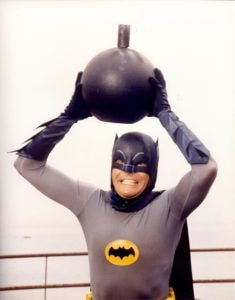|
Alright, here we go. It’s topical reference time: Earlier this year television watchers reacted to the season finale of AMC’s The Walking Dead with, and I’m putting this lightly, scorn. (Nailed it.) Without steering this car deep into spoiler country, the negative press stemmed largely from the fact that season 6 ended on a blatant and rather poorly executed cliffhanger. It got me thinking about the cliffhanger as a narrative device and whether or not it still holds a place in storytelling in 2016.  See, when I think of a cliffhanger I remember the terrible narration that ended many episodes of the 1960s version of Batman: “Will the Caped Crusader make it out of this alive? Or will the Joker finally have the last laugh? Tune in next week to find out! Same bat time, same bat station!” And it’s true that in the ensuing fifty years we as writers and consumers have come to expect a little more subtlety than that. However, essentially the same trope still exists largely unchanged: Leave the conflict unresolved until the next episode. We as humans crave resolution. Having half a story infuriates us. And what AMC and old Batman do is give viewers 99% of a story, which is sort of like receiving 99% of a blowjob: Yeah, what you get is not bad, but it’s so much better with the payoff. This, understandably, gives viewers a sort of television blue balls, and like regular blue balls it’s maddening. So AMC got to eat a bunch of bad press earlier in the year, banking on the fact that the numbers from season 7’s imminent debut will justify the fact that they pissed off their entire fanbase. And they absolutely will. See, from a consumer standpoint maybe we don’t need cliffhangers. Game of Thrones wrapped its season around the same time as The Walking Dead this year having answered all of its posed questions, and you can bet your ass that every single viewer is going to tune in when the next season of GoT starts airing. That’s what you get when you offer compelling storytelling. Which isn’t to say that The Walking Dead isn’t compelling, but from a production standpoint a cliffhanger adds a sort of guarantee onto the potential success of the next episode. It’s like an entertainment loan: You piss people off now so that they’ll be forced to pay you back in views later. It’s an interesting little piece of psychological manipulation.
So, without going into a ton of detail, we return to the question of whether 2016 still needs cliffhangers. I honestly don’t know. Personally, I would be happier if they were gone, but in a rare show of humility I’m going to remind everyone that my opinion is not concrete fact in this case.
I’m like two for three on shows of humility in my last articles; it’s been a good month.
0 Comments
Leave a Reply. |
Author
Scott Watmough has many strong opinions about many things that he knows very little about. They're usually about video games. Archives
March 2018
Categories |


 RSS Feed
RSS Feed
